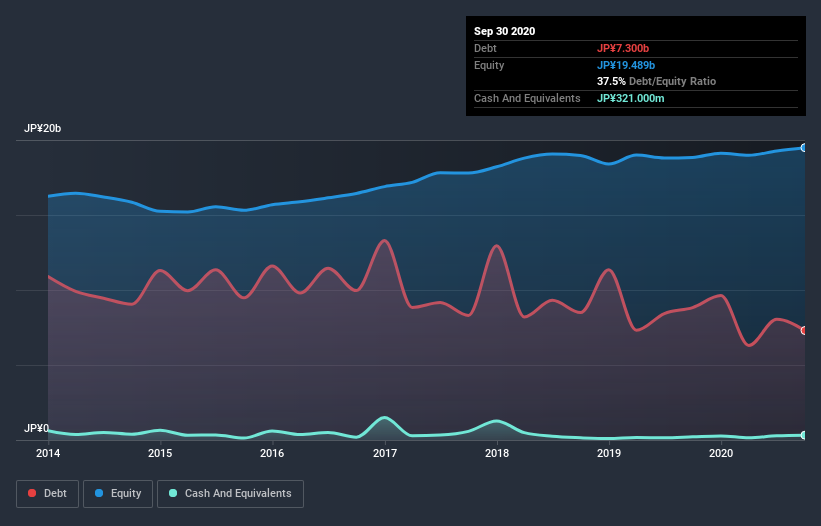
Howard Marks put it nicely when he said that, rather than worrying about share price volatility, 'The possibility of permanent loss is the risk I worry about... and every practical investor I know worries about.' It's only natural to consider a company's balance sheet when you examine how risky it is, since debt is often involved when a business collapses. As with many other companies CB GROUP MANAGEMENT Co., Ltd. (TYO:9852) makes use of debt. But the real question is whether this debt is making the company risky.
What Risk Does Debt Bring?
Debt and other liabilities become risky for a business when it cannot easily fulfill those obligations, either with free cash flow or by raising capital at an attractive price. If things get really bad, the lenders can take control of the business. However, a more common (but still painful) scenario is that it has to raise new equity capital at a low price, thus permanently diluting shareholders. Of course, plenty of companies use debt to fund growth, without any negative consequences. The first step when considering a company's debt levels is to consider its cash and debt together.
View our latest analysis for CB GROUP MANAGEMENT
What Is CB GROUP MANAGEMENT's Net Debt?
As you can see below, CB GROUP MANAGEMENT had JP¥7.30b of debt at September 2020, down from JP¥8.83b a year prior. However, it does have JP¥321.0m in cash offsetting this, leading to net debt of about JP¥6.98b.

A Look At CB GROUP MANAGEMENT's Liabilities
The latest balance sheet data shows that CB GROUP MANAGEMENT had liabilities of JP¥26.0b due within a year, and liabilities of JP¥2.84b falling due after that. On the other hand, it had cash of JP¥321.0m and JP¥24.2b worth of receivables due within a year. So its liabilities total JP¥4.26b more than the combination of its cash and short-term receivables.
This deficit is considerable relative to its market capitalization of JP¥5.73b, so it does suggest shareholders should keep an eye on CB GROUP MANAGEMENT's use of debt. This suggests shareholders would be heavily diluted if the company needed to shore up its balance sheet in a hurry.
We use two main ratios to inform us about debt levels relative to earnings. The first is net debt divided by earnings before interest, tax, depreciation, and amortization (EBITDA), while the second is how many times its earnings before interest and tax (EBIT) covers its interest expense (or its interest cover, for short). This way, we consider both the absolute quantum of the debt, as well as the interest rates paid on it.
CB GROUP MANAGEMENT has a debt to EBITDA ratio of 3.9, which signals significant debt, but is still pretty reasonable for most types of business. However, its interest coverage of 1k is very high, suggesting that the interest expense on the debt is currently quite low. If CB GROUP MANAGEMENT can keep growing EBIT at last year's rate of 18% over the last year, then it will find its debt load easier to manage. When analysing debt levels, the balance sheet is the obvious place to start. But it is CB GROUP MANAGEMENT's earnings that will influence how the balance sheet holds up in the future. So if you're keen to discover more about its earnings, it might be worth checking out this graph of its long term earnings trend.
But our final consideration is also important, because a company cannot pay debt with paper profits; it needs cold hard cash. So it's worth checking how much of that EBIT is backed by free cash flow. In the last three years, CB GROUP MANAGEMENT's free cash flow amounted to 40% of its EBIT, less than we'd expect. That weak cash conversion makes it more difficult to handle indebtedness.
Our View
On our analysis CB GROUP MANAGEMENT's interest cover should signal that it won't have too much trouble with its debt. But the other factors we noted above weren't so encouraging. For instance it seems like it has to struggle a bit handle its debt, based on its EBITDA,. Looking at all this data makes us feel a little cautious about CB GROUP MANAGEMENT's debt levels. While debt does have its upside in higher potential returns, we think shareholders should definitely consider how debt levels might make the stock more risky. There's no doubt that we learn most about debt from the balance sheet. However, not all investment risk resides within the balance sheet - far from it. For instance, we've identified 2 warning signs for CB GROUP MANAGEMENT that you should be aware of.
At the end of the day, it's often better to focus on companies that are free from net debt. You can access our special list of such companies (all with a track record of profit growth). It's free.
When trading CB GROUP MANAGEMENT or any other investment, use the platform considered by many to be the Professional's Gateway to the Worlds Market, Interactive Brokers. You get the lowest-cost* trading on stocks, options, futures, forex, bonds and funds worldwide from a single integrated account. Promoted
New: AI Stock Screener & Alerts
Our new AI Stock Screener scans the market every day to uncover opportunities.
• Dividend Powerhouses (3%+ Yield)
• Undervalued Small Caps with Insider Buying
• High growth Tech and AI Companies
Or build your own from over 50 metrics.
This article by Simply Wall St is general in nature. It does not constitute a recommendation to buy or sell any stock, and does not take account of your objectives, or your financial situation. We aim to bring you long-term focused analysis driven by fundamental data. Note that our analysis may not factor in the latest price-sensitive company announcements or qualitative material. Simply Wall St has no position in any stocks mentioned.
*Interactive Brokers Rated Lowest Cost Broker by StockBrokers.com Annual Online Review 2020
Have feedback on this article? Concerned about the content? Get in touch with us directly. Alternatively, email editorial-team@simplywallst.com.
About TSE:9852
CB GROUP MANAGEMENT
Operates as a specialized trading company primarily in Japan.
Excellent balance sheet with proven track record and pays a dividend.
Market Insights
Community Narratives




